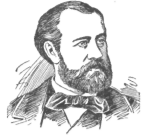GOULD 786 GOUNOD
Description
This page of the book is from "The New Student's Reference Work: Volume 2" by Chandler B. Beach, Frank Morton McMurry and others.
GOULD
786
GOUNOD
ward went to New York city, finding employment in the Methodist Book Concern. He lost his position through dissipation and drunkenness In 1842 a Quaker induced him to sign the pledge, and he soon afterwards determined to spend his life in temperance work. He lectured with great pathos, humor and earnestness throughout America. The power of his oratory over his hearers was great, as was also his success in winning drunkards to a sober life. In 1853 he was engaged by the London Temperance League, and spent two years in lecturing in England, and again went to England in 1857 and 1878. He died at Frankfort, Pa., Feb. 18, 1886. See his Sunlight and Shadow.
Qould, Benjamin Apthorp, was born at Boston, Sept. 27, 1824, and graduated from Harvard in 1844 and from G÷ttingen University, Germany, in 1848. On his return to America he conducted the Astronomical Journal for 12 years; was director of the Dudley Observatory; and the first to determine the difference in longitude between America and Europe with mathematical exactness, In 1868 he was given charge of the National Observatory at Cordoba, in the Argentine Republic, and there mapped out a large part of the southern heavens. He returned to the United States in 1885. He published some valuable astronomical reports and charts, and died at Cambridge, Mass., Nov. 26, 189Ŏ.
Qould, Jay, American financier, was born at Roxbury, N. Y., May 27, 1836, and died at New York Dec. 2, 1892. He is an interesting example of the American self-made man, for, with little education and no advantages from family connections or other aids, he acquired a commanding place in the American financial world and died leaving an estate estimated at over seventy million dollars. Brought up on his father's farm, he had but little schooling; yet what he obtained at Hobart Academy showed him to possess a taste for mathematics and surveying. The latter he himself early put to use in conducting surveys, which enabled him to engage for a time in the lumber business and later to acquire an interest in a bank at Stroudsburg, Pa., and the bonds of a railroad. These investments turning out well, he established himself as a broker in New York city. He later acquired controlling interest in the Erie Railroad, and was for a time its president, and subsequently became a heavy operator in the stock of the Pacific and other railroads, eventually forming what became known as the Gould system, aggregating some 13,000 miles of railway plant. He also became financially interested in the New York elevated railways and in the Atlantic, Pacific and Western Union telegraph companies, which added their quota to his colossal fortune.
Qould, Helen Miller, is America's Lady Bountiful whom the world is beginning to compare with Lady Burdett-Coutts. Born in 1868, the oldest daughter of Jay Gould, she became, on the death of her mother, her father's close companion and adviser. At the age of 24 she inherited a fifth of his estate of $70,000,000, and was named one of its executors. To fit herself for these duties she took the full course in a law school. Her brothers and sister married, she retired to her country home, Lyndhurst, on the Hudson, and devoted her life and fortune to benevolence. So quietly did she go about her good work, however, that the world heard little of her until the opening of the Spanish-American War, when she gave the United States Government $100,000 for national defense; and went in person to Camp Wykoff, Cuba, to superintend the distribution of $50,000 worth of comforts to sick soldiers.
At Woody Crest, on her Hudson River estate, Miss Gould has built and maintains a vacation home for the children of New York's slums. She supports beds in the Babies' Shelter, gives free scholarships to poor, promising students, and obtains positions for a number of boys and girls. Her mail is so large as to require a private secretary. Many requests for help must be refused; worthy objects of benevolence she personally investigates. It was after a visit to the district around the Brooklyn Navy Yards, that she built the Y. M. C. A. clubhouse to keep "Jack Ashore" from temptation.
Under the medium height, dark-haired, dark-eyed, shy, the lady of Lyndhurst dresses simply and is unknown to society She works as hard as if she had to make her living, and says that nothing seems to her so pathetic as idleness and the lack of some worthy absorbing interest. Russell Sage said that she is a splendid railroad man.
Qounod (goo'n˘'), Charles Franšois, an eminent composer, was born at Paris, June 17, 181 8, and studied music at the conservatory there, afterward going to Rome to complete his education. While at home he gave his time mostly to sacred music. The first work to bring him any notice was the Messe Solonnelle. His first opera, Sappho, was produced in 1851, and in 1859 Faust, the greatest and most enduring of his works, met with immense success. Some of his other works are La Reine de Saba (1862); Romeo et Juliette

CHARLES F. GOUNOD


